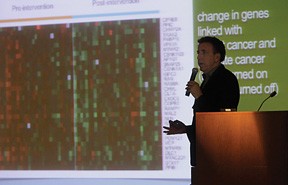Members of the UA and Tucson community packed DuVal Auditorium at the University of Arizona Medical Center on Monday evening, for a presentation on lifestyle changes.
The presentation, put on by the UA College of Public Health, was part of the 2013 James E. Dalen Distinguished Lecture for Health Policy. Each year, the College of Public Health sponsors a “renowned” doctor or person who works in policy, nutrition and health in general, according to Iman Hakim, dean of the UA College of Public Health.
“It is part of our mission, the college, for outreach and health education for our community,” Hakim said. “We open the talks not only to the faculty and students but the entire community, so we can bring to them the cutting edge healthcare issue and policy to everyone.”
The best pick for this year, according to Hakim, was Dr. Dean Ornish, who gave a presentation titled, “The Transformative Power of Integrative Medicine.”
Ornish is a founder and president of the nonprofit Preventative Medicine Research Institute and Clinical Professor of Medicine at the University of California, San Francisco. Ornish is also an author of six best-selling books, and was recognized as one of the seven most powerful teachers in the world by Forbes Magazine, according to the event pamphlet.
Ornish focused primarily on how various lifestyle changes can dramatically affect the health of an individual.
“So often I hear people say … ‘Oh, it’s all in my genes, there’s nothing I can do,’” Ornish said. “Well, it’s not true, and I say that not to blame but to empower.”
Genes may be predisposed, but they are not a person’s fate, he added. It just means that some people need to make bigger lifestyle changes than others.
Ornish then moved into talking about what it is exactly that enables people to make sustainable changes. As a doctor, Ornish said he used to try to scare people into changing their lifestyle, but soon found out that it wasn’t an effective way to motivate people.
“The problem is, is that so much of what we try to do is, the whole concept of risk factor modification, even the concept of prevention is fear based,” Ornish said. “Don’t smoke so that years from now you don’t get cancer. Don’t eat that cheeseburger so that years from now you don’t get a heart attack. Fear is not a sustainable motivator.”
The reason that lifestyle changes work, is because people feel better, he added.
“There’s no point in giving up something that you enjoy, unless you get something back that’s better,” Ornish said. “And because these biological mechanisms are so dynamic, most people find that they feel so much better so quickly.”
When a person eats healthier, manages stress, exercises, or loves more, their brain gets more blood flow within hours, according to Ornish. They think more clearly, they have more energy and need less sleep.
Ornish expanded his speech to include how the health of an individual can affect the entire planet, including positive effects on the energy crisis, global warming and the healthcare crisis.
Ricky Anderson, a sports marketing sophomore, said that although he only attended the event for extra credit, he was glad he went.
“Managing stress, eating right, being loved and touched by others, and even though it sounds corny and cheesy, it all kind of clicked and made sense,” Anderson said. “All around, the whole thing was great.”









